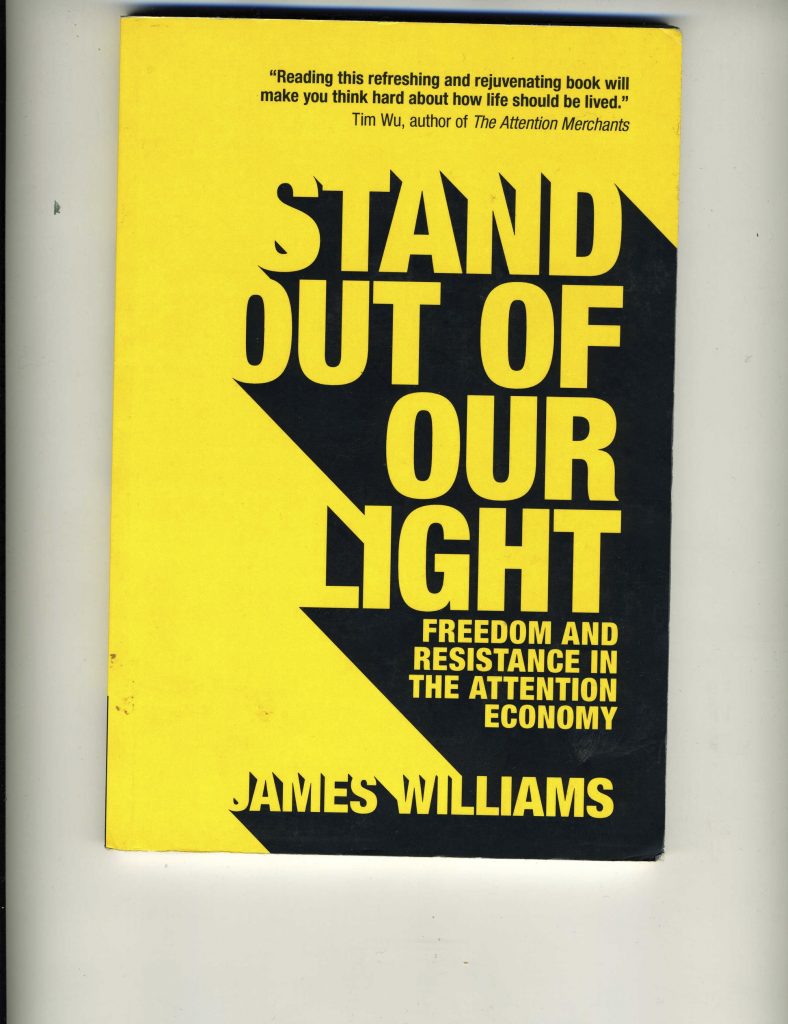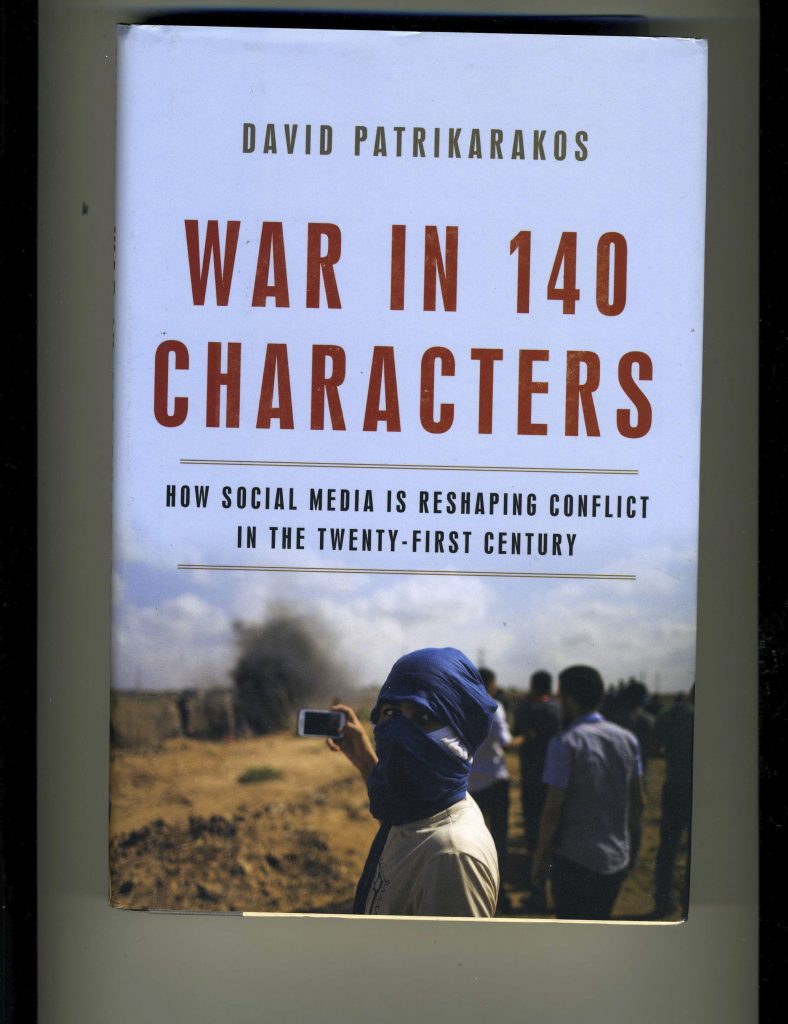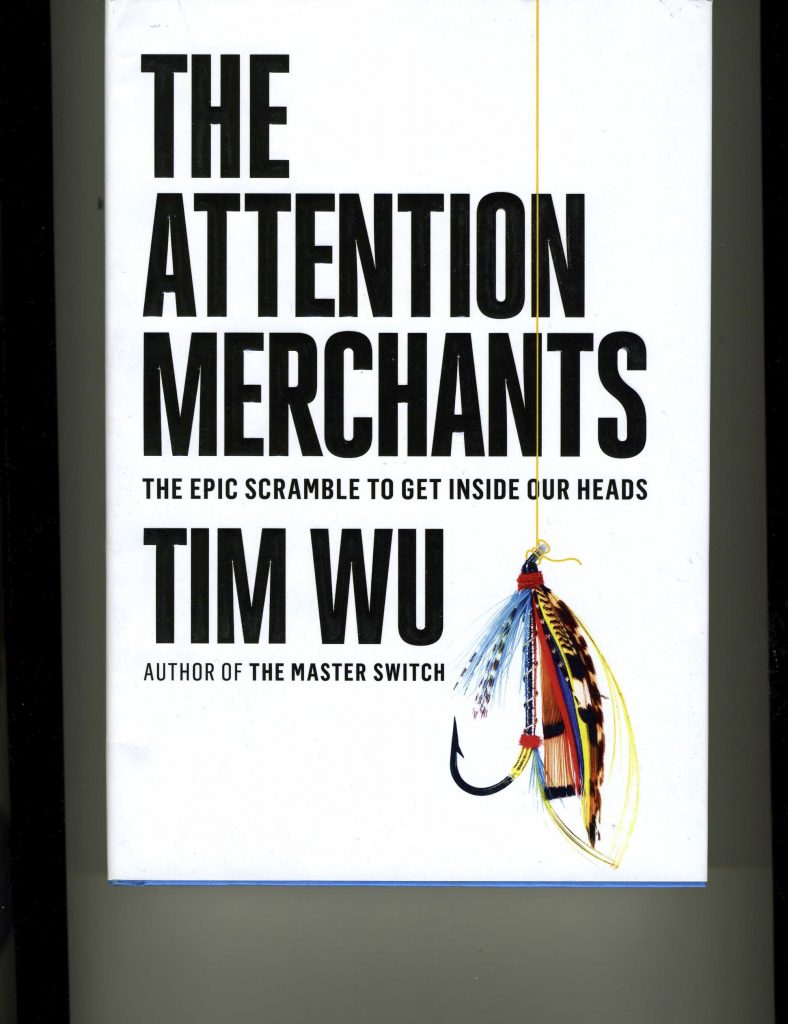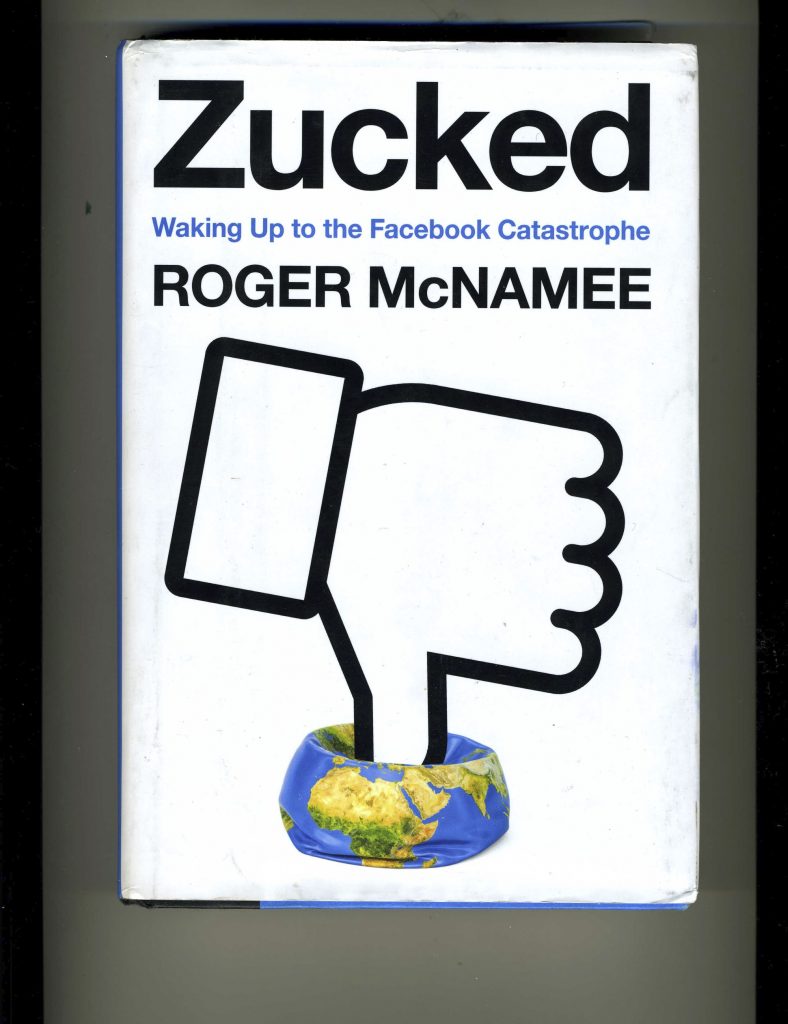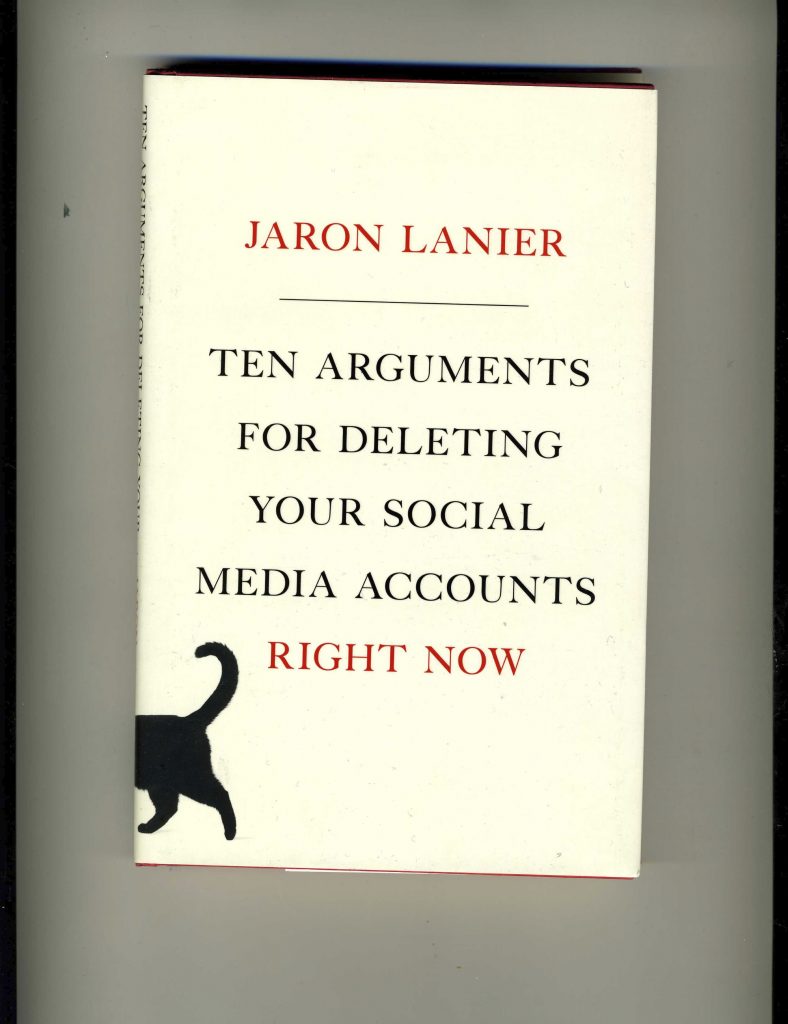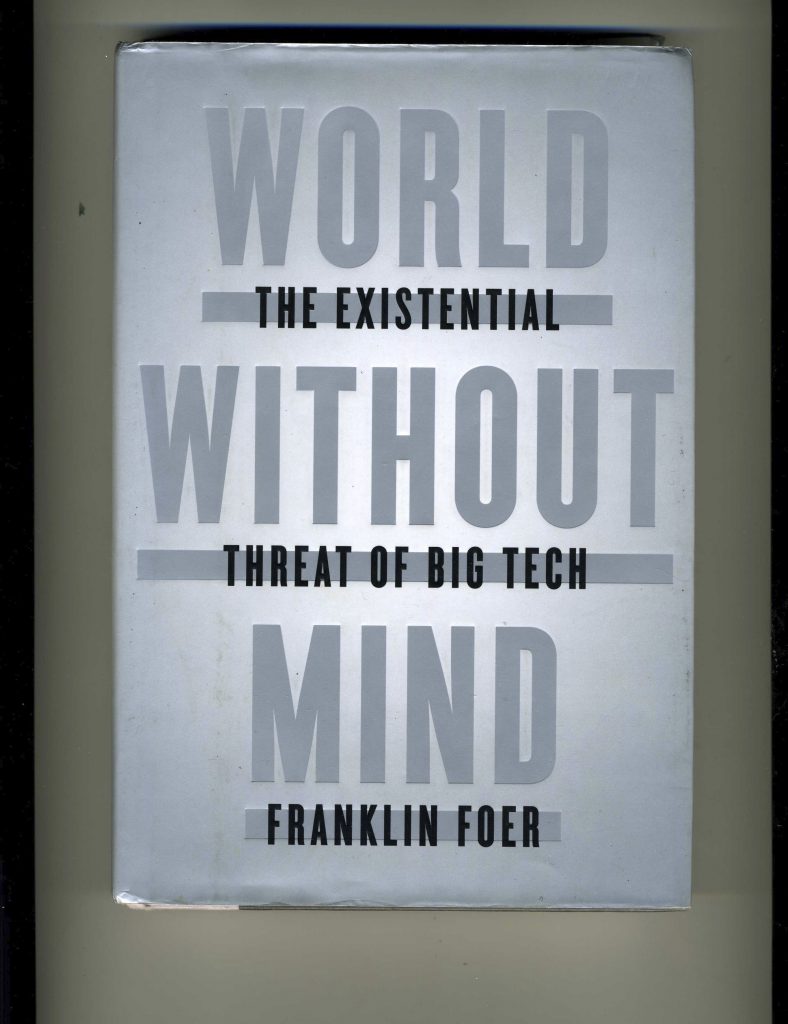One of the brothers who sells us paint mentioned an interview he heard that morning with a black athlete. I didn’t catch the name. The athlete described how often he would be stopped by the police. Peter said, “I had no idea. He’s a very rich athlete.” Peter was in effect asking the police what they are doing. Why are you picking on him, this man I admire so much, picking on him for his colour of skin? Peter says, ‘I had no idea. I don’t know enough about this racism. I need to know more.” That goes for me too, Peter.
We have these ideas of something and think we know what it is. We say, yes there is racism but we don’t know. As with Peter’s intent, we need to know more, and the more we learn, the less we know. That is the more we learn, the more the complexity is apparent. Nothing is ever as simple as we assume when we don’t know much.
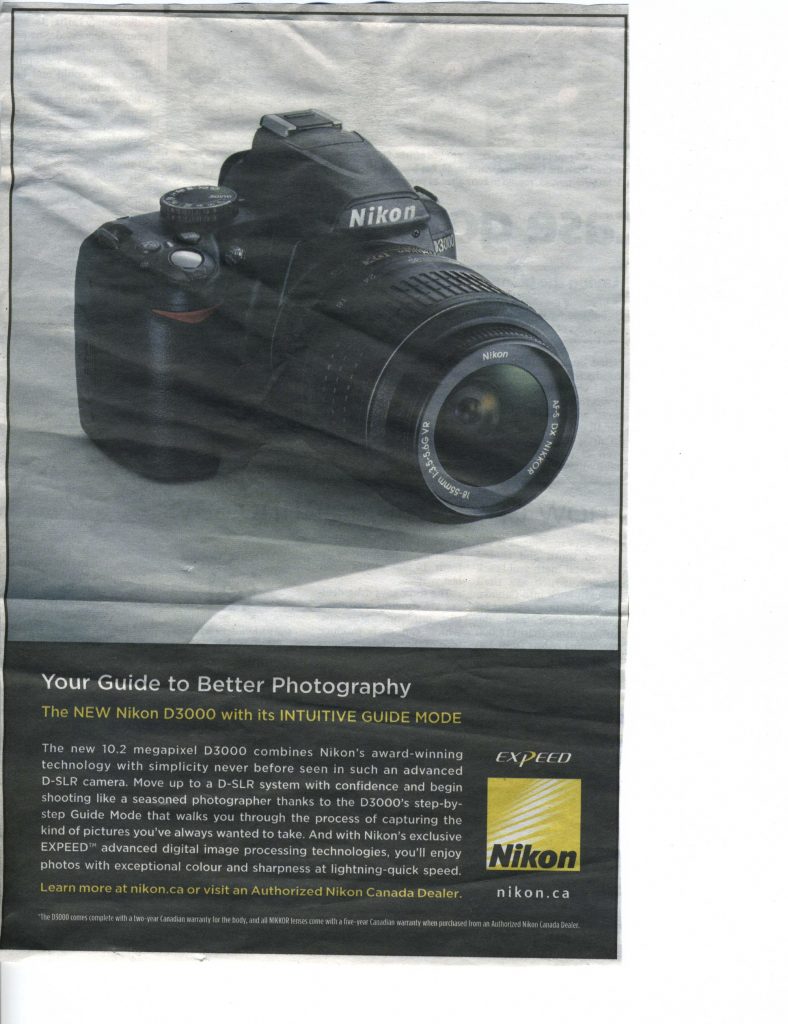
I would show this ad to students and ask them if there’s anything peculiar about the message. They wouldn’t see the really odd claim in this copy perhaps because they have been raised their whole life in the culture of consumer marketing and don’t question it. With the purchase of this camera, the ad promises, and thanks to the new easy-to-use guide system, you the purchaser can “begin shooting like a seasoned photographer.” I point out the absurdity of students paying tuition at the college for the two year or four-year photography programs when all they have to do is buy this camera nd shoot like an experienced pro.
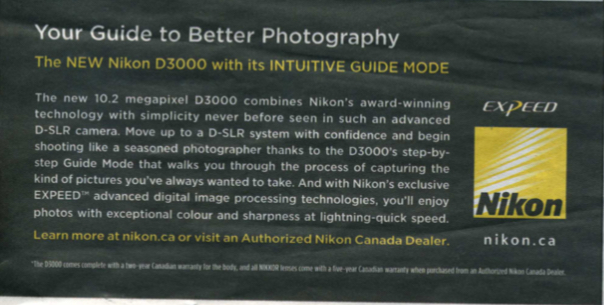
Nikon publishes this with such confidence. The reader can’t help but be excited. Nikon knows the trick for selling their cameras: the ‘pictures you’ve always wanted to take.’ They zero in on your desire (if you happen to be their target group: someone who takes pictures and wants better pictures). Then they make your desire easy. And you believe them, buy their enthusiasm. They carry you right along establishing their trust and integrity: “award-winning, simplicity never before seen, move up, with confidence, exclusive, advanced, authorized.” You are swept up not so much by your photographic interest, but your desire to live well, be accomplished, be the best, unique, authentic. All the descriptors aren’t really about the camera, but about you. That’s the great trick on our brain. We are made to be the camera, the camera us, our identity that we’re buying.
Even after I pointed out to the students that photography may not be as easy as suggested in the copy, were only slightly convinced. Then I showed them some stunning photographs taken by outstanding photographers, that is seasoned photographers, and ask them if they think they could buy the camera and take a picture like that. The more the students learn about the subject, the more they realize what they don’t know, and how foolish their initial assumptions were.
Well, not me, you say; you want to believe you wouldn’t fall for this.
Racism. As Peter said, he needed to know more. He was awakened through the interview with the black athlete to a world he had no idea about. It moved him because he has admiration for the athlete and was moved by the emotion and injustice in the story.
Have you noticed when you are listening to a news report about something you know a lot about, there are a lot of mistakes made or at least important points missing in the report? The more we know, the better we are able to judge. If we had spent years studying photography, we would laugh at this ad, but how easy to not realize the sophistication of the manipulation in the words about a subject we know little.
One of the damaging aspects of our new digital online world is that the marketers, the media companies, can focus on us directly. Nikon way back when it sold the D3000 had to publish in magazines and try to catch any of the readers who flipped through the magazine and were at the moment interested in moving up to a better camera to make a sale or build recognition of their brand. Now, the companies know so much about you, have thousands of profile items on you. FB has 15,000 profile items on you, pages and pages of data on you, that the FB AI crunches so FB not only knows exactly where to find you but what you want, your subconscious desires and vulnerabilities. There is no longer much happenstance that you will receive any notification that doesn’t affirm all the assumptions you have. We are no longer watching the consumer culture from a distance. We are breathing it and don’t know it. Nothing in your feel though to suggest you might not know enough.
Well, it’s more insidious. Big tech doesn’t just present you with a product or service; they shape your behaviour, get you to do what they want. It’s not me telling you this. It’s the most informed tech watchers telling you this.
It’s said, soberly, that the big data companies with their AI, -Google, Amazon, FB, Apple, Microsoft… actually know more about you than you know about yourself. They know where you and your phone are every moment, certainly, even if you aren’t using the phone. That’s a given. They listen to what you say, they see you with the camera, read the expression on your face as you surf, even record the changes in your skin tone as you read. Didn’t know that? They don’t just know the details, they are able to use your data to predict your behaviour and they do it well. They predict if you’re going to get pregnant from comparing the thousands of bits of information tracking you now for years. They know if you have a tendency to addiction. And what do they do with that information? Not just sell to you. They know when in the day you are most vulnerable, they know your weak moment, and they hit you then. Yes they do.
What’s worse, the AI is so sophisticated, the platforms so designed to persuade, that the companies can create desire. The most sophisticated AI in the world, that beat humans at the game of GO, the supreme test for AI superiority, is being used for selecting your You Tube videos. FB did an illegal (of course) experiment on 200,000 customers (without telling any of them, of course). Half were the experimental group and half the control group. FB research was to test if their techniques could make people sadder. Yes they could, they found out. FB successfully made most people in the experimental group sadder even though the subjects had no personal reason to be sadder.
Here’s an excellent doc, Coded Bias, about AI and racial bias and its damaging consequences for all of us, a film now playing at the Hot Docs film festival. A film to wake us up. https://boxoffice.hotdocs.ca/websales/pages/info.aspx?evtinfo=125068~741853d5-bf72-40a5-a015-09aded779383&epguid=8096360b-ce32-4b75-868d-893fb4337e9d&
Should you be interested, should you want to know more so you won’t assume what big tech tell you is true, that they want to make your life better, give you the all the great art and literature, offer you the whole world on your phone in fact, make you life easier and more convenient, then the following books are a good start.
The authors are not tech luddites. They are pioneers and leaders in internet and technology business and are academic authorities from Columbia and Oxford. In my day, it was broadcast media, understanding broadcast media’s effect on us that was the concern; the prophets were Joyce Neilson, Neil Postman, Jerry Mander and others. Today is the same that they spoke of, but now the machine is in your pocket and targets you specifically and has far more influence than broadcast ever had. I hope you can read these important books that are attentive to our collective future. They are all in the library system.
So Reg, where are you going with your title ‘racism and me’? It might seem I’m off track of my topic with this diversion about media influence, but I think it’s a way in to the topic. If we see how easily we are influenced, how much effort is made to making us feel like the whole world is designed to cater to our emotions and our desires, that all the coddling of us makes huge profits for the media companies, if we see that first, then we might question ourselves more, doubt ourselves more, examine our assumptions which often are foistered on us to appease us, coddle us, suck us dry. Once there, we might listen, study, question and know things better, such as the hard things, the racism and poverty and human misery others live with.
If we are not aware of how easily big tech social media shapes our behaviour, we can hardly think critically about the world we live in.
What’s my beginning point. Like Peter, I can’t assume to know anything. I also know that my education is an education filtered by the winners in society. I’m not going to learn about how my legacy of leaders that built my country, that winning colonialist power, abused and murdered people to cater to the fashionable tastes of the British public, oh, and make a lot of money for British companies. I’m not going to be told this. Only recently, and with great reluctance and resistance is there some revisionist history seeping into school curricula. I have to think and question and find out.
It’s very hard to face up to ourselves being part of a system that causes so much harm. We want to believe the conduct of our leaders and our national institutions are virtuous. Ordinary people are in my experience virtuous, do care, do have empathy. To think the power structures that deliver society to us are giving us a nice life at the expense of others is hard to take. There’s more slavery in the world today than when the slave trade was abolished. We need to know that. We accept the argument of politicians who tell us to cut education, cut social welfare, cut library services, cut indigenous fisheries, cut public health because there just isn’t the money. No. Lot os money. In 2016, the wealthiest company in the world on billions of dollars of profits, paid no taxes. We need to know that. They’re not going to tell us. They’re going to tell us that nurses and teachers make too much money. Sorry, but the ‘enough is enough’ movement is telling us they have had enough of a few profiting from the suffering of so many. We need to know what they know.
Behind the current social protest enflamed with the murder of George Floyd is years of attempts to right wrongs. Years of all the academic studies and reports being ignored, all the calls to cull back a growing militarized police service… Deaf ears until now. Statutes of cruel racist leaders are being taken down from the front of government buildings. Finally.
I think for me, the thing to know, to start with is how deep and serious and real is racism. Here are a couple of links below to waken us up, get us going. They reference America. It’s not to say we don’t have the same racism here.And the truth is America is so influential on us, the two of us so closely aligned that what goes on there is about us, too. I’ve written about the treatment of the Inuit I learned when living in Nunavut for a couple of months. It’s here as much as in the south if differently conveyed.
The point of the Ideas show in looking back to post civil war race relations in the south is to say the race issue of the American Civil war was never resolved, today still that same war. The photographs by Rich Dawkins say so much about the divide. The animosity and hate of many white people for black people is so pervasive, so terrifying, so surprising. We need to know so we understand, really understand, how little we know, how much we really need to listen not opine, but listen and learn.
In the CBC Ideas documentary, ‘American’s Other Civil War,’ historians trace the unresolved issue of slavery and racism into the 20th century and our own time. Be careful if you choose to listen. You may become very depressed over what human beings, intelligent and educated human beings can do to other human beings, all over the colour of one’s skin. Be careful, it could wrench apart your soul. But do listen. For the sake of knowing more, knowing how little we know. How foolish are our assumptions. How much we need to listen.
Ideas on CBC American’s Other Civil War: how white nationalism led to civic coup d’etat. https://www.cbc.ca/radio/ideas/america-s-other-civil-war-how-white-nationalism-led-to-civic-coups-d-tat-1.5151203
Richard Dawkins is an exceptional photographer and administrator. In this interview he talks about his iconic photographic of a Kentucky all-white team unexpectedly losing a championship to an all-black up-start team. Reading in the photo that the stares of he Kentucky team are not for their loss but hatred for the black players is shocking.
I can’t seem to help this tone of writing. It’s a bit harsh and heavy-handed. I haven’t made it palatable. Not good enough at it yet. The Dalai Lama just remarked that the secret to happiness is a warm heart and care for others. I don’t want you to feel the weight of this writing as the burden of the world you must bear; I want us to be happy, but we do need a push to break from our pervasive media fog, that keeps us unmoved. Microsofts’s AI was put on social media to learn, and was removed in 16 hours because it had learned from the traffic to be a “racist, misogynist, hateful asshole.” The evidence is there about the social media world we live by. We just have to own up to it. I don’t know how to present this in a subtle way, ease you into it. The authors above do much much better, but I have to try to do my part, do something.
If you read this far, read through all my bashing away at the comforts we live by, if you got through all the wrenching argument and hung in, then you are an old soul. You are big enough for this; you are needed to help us all through, to find our collective happiness, encourage us to be good to each other, do this together, to take care, not give in to all the noise. We begin with not knowing. Begin with finding out. Listening.
Take care.
